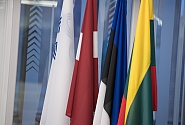
The Baltic Assembly strongly condemns the Russian Federation’s military invasion in Ukraine and Belarus’ involvement in the attacks, said the Baltic Assembly’s statement on Russia’s invasion of Ukraine, adopted on Thursday, 24 February.
In its statement, the Baltic Assembly strongly calls on the Russian Federation to immediately stop the attacks on an independent state that is strongly supported by the European Union and NATO and end any further provocations against Ukraine.
“We, representatives of the Baltic Assembly, are shocked by Russia’s actual invasion of Ukraine,” said the President of the Baltic Assembly, the head of the Latvian delegation, Jānis Vucāns, stressing that what is happening is a gross violation of Ukraine’s independence and international law.
Parliamentarians reaffirm in the statement their full support for Ukraine and its people, as well as their commitment to use all available diplomatic and political means to provide political, military and financial support to Ukraine’s security.
The Baltic Assembly calls on the international community, including the European Union, NATO and other organisations, to actively condemn Russia’s invasion in Ukraine, and to immediately stop Russia’s efforts to undermine peace and security in Europe.
The statement underlines the need for co-responsibility of Russian parliamentarians who voted for the recognition of the self-proclaimed Donetsk and Luhansk ‘People’s Republics’ in Eastern Ukraine, thus allowing Russian troops to carry out military attacks in Ukraine.
The Baltic Assembly concludes that parliamentarians of the Baltic States must strongly oppose the provocations of the Russian Federation, and cooperate with other international organisations in order to stop the useless and unjustifiable aggression against Ukraine and the entire European democratic society, says the statement.
About the Baltic Assembly:
On 1 January 2022, Latvia assumed the presidency of the Baltic Assembly.
The Baltic Assembly is an inter-parliamentary cooperation organisation of Latvia, Estonia and Lithuania established on 8 November 1991. The Baltic Assembly consists of national delegations – 12 to 16 members from each country’s parliament. The Baltic Assembly is a coordinating and consultative organisation, which has a right to express its opinion to the national parliaments and governments of the Baltic States, as well as the Baltic Council of Ministers, in the form of resolutions, decisions, declarations, and recommendations; it also has a right to request the above-mentioned bodies to provide information on cross-border issues that are high on the Baltic Assembly’s agenda.
Saeima Press Service







